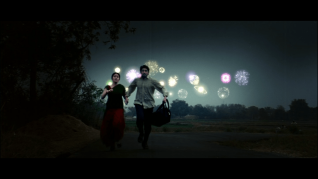
Anil Ravipudi’s latest film Sarileru Neekevvaru is an odd mix of action and comedy that individually are fine but which don’t gel together particularly well. On the plus side, Mahesh Babu is excellent, Vijayashanti is an absolute standout and Prakash Raj is back to doing what he does best as a nasty and vindictive villain. It’s an entertaining film but for me could have been better if Anil Ravipudi had stuck to just one idea and made 2 movies instead.
The film opens with Bharati (Vijayashanti) establishing her no-nonsense persona by slapping a drunk and obnoxious student in her class before moving northwards to introduce Major Ajay Krishna (Mahesh Babu), a bomb disposal expert in the army. After setting a rather somber tone with Ajay in front of the Indian flag, the film takes an abrupt turn into comedy as Ajay is called to defuse a bomb but insists on his side-kick Shiv Prasad (Rajendra Prasad) brewing him a cup of coffee first. Then just as quickly things turn serious again as Ajay shoots the bomber dead after a short chase through the streets. It’s this jerky transition between comedy and action that makes it difficult to connect with the film as the emotional changes are too sudden to be anything other than jarring, even though each works well for that particular scene.



Bharati’s son Ajay is also a soldier in Major Ajay’s team, but when he is seriously injured in action, Major Ajay goes to visit Bharati to try and break the news sometime during her daughter’s wedding. This is another scene that doesn’t sit well, as it seems quite unlikely that this would actually happen in real life, given that there was no need to keep the incident secret. It also seemed an unlikely use of resources to send a bomb expert away to a wedding when his talents were so clearly needed by the army. It’s obvious at this stage where the film is going to go since Major Ajay is an orphan, but the whole set-up is too filmi and contrived to fit naturally into the story.




On the train the film switches back into comedy as Ajay meets Samskruthi (Rashmika Mandanna) and her crazy family. Samskruthi is desperate not to marry her father’s choice of a groom and enlists her two sisters and her mother (Sangeetha Krish) in every more ridiculous schemes to find an alternate husband. Most of this is laugh-out-loud funny, but some portions are simply inappropriate and not at all amusing – there is nothing funny about rape or domestic violence for instance. However I enjoyed watching the heroine stalk the hero for a change, even if it is clumsily set up. Rashmika is good in these comedy sequences, but I kept wishing that I just wish that Samskruthi had been less of a loosu ponnu caricature and had more to do than just chase after Ajay. I’ve seen Rashmika in a few films now and she is an excellent actress so it’s a real shame that she doesn’t have more to do here, especially in the second half. The best comedy actually comes from Sangeetha as Samskruthi’s mother. She has some of the funniest facial expressions and excellent comedic timing throughout, even making her oft-repeated line about being married off at 14 years of age much funnier that it really should be.



It is odd that Samskruthi is such a poorly realised character since Anil Ravipudi proves he can write a good female role with Bharati. Vijayashanti is superb here and her defiance of MLA Nagendra Reddy (Prakash Raj) is very well written. I really like how she is a strong and confident woman who has managed to raise her family, maintain a farm and teach medicine as a single parent. Her confrontations with Nagendra Reddy work well, and her gradual adoption of Ajay seems plausible given her overall character. It’s good to see someone other than the hero get the chance to fight back, and even though she then relies on Ajay to ‘rescue’ her, Bharati still gets stuck in when she needs to.



There are a number of brief appearances from CinemaChaat favourites including Ajay as one of Nagendra Reddy’s thugs, and Subbaraju as Crime Branch Koti; an investigator who becomes involved when a number of murders are discovered relating to Nagendra Reddy. Rao Ramesh appears as Samskruthi’s long suffering father and Jayaprakash Reddy is excellent as Nagendra Reddy’s father who has very clear ideas about how to get rid of any opposition. The mix of comedy and action works better in the scenes with Prakash Raj and his various thugs, although there is still the odd serious note that appears to break the flow of the film. Part of this harks back to Ajay being in the army, and he repeatedly brings up the fact that soldiers are at the border defending the country against attack, while politicians feather their nests and don’t look after the people they are meant to represent. It’s a fair point, but I don’t think comparing the army to the politicians works as well as Anil Ravipudi may have wished. I can see what he’s getting at, but I don’t think that bringing the army into the discussion is necessary to point out why Nagendra Reddy and his counterparts are bad men.



The film itself is well put together with fantastic action sequences while Mahesh looks fighting fit and appropriately athletic throughout. The comedy sequences too are well put together, and it’s mainly the melding of these components that seems to have been skipped. Sarileru Neekevvaru works as a better than average Mahesh movie thanks to the strong supporting cast and a reasonable storyline, but it could have been just that little bit better if either the comedy had been toned down or the action made less heavy-handed. It’s still a worthwhile watch and worth it for Mahesh, Vijayashanti and Prakash Raj.


















































